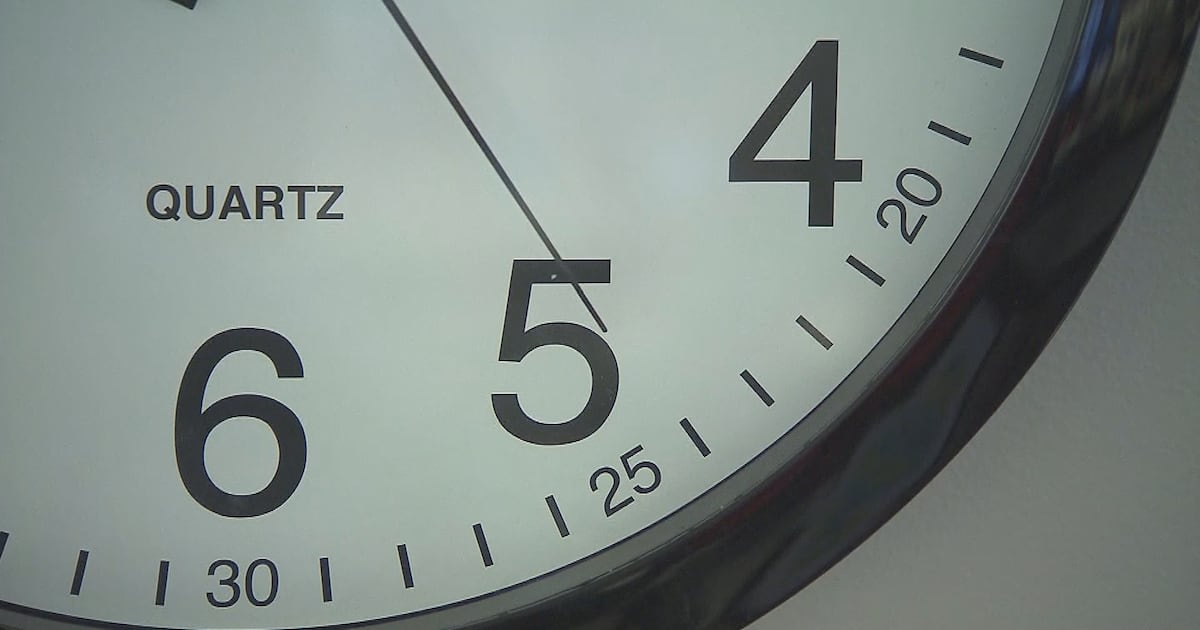Health
Sleep Expert Offers Tips for Adjusting After Daylight Saving Time

Clocks shifted back one hour at 2 a.m. on March 3, 2024, marking the end of daylight saving time and the transition to standard time. This change can disrupt sleep patterns and affect overall well-being, according to sleep consultant Amanda Jewson. As the days grow shorter and darkness increases, many individuals report feeling more fatigued after the switch.
Jewson explains that while adjusting to standard time can be challenging, it may also have physiological benefits. “We like to go to bed later,” she states, emphasizing that the time change allows for a later bedtime. However, she acknowledges that many people still experience grogginess following the transition. “That could be related to some of the light exposure,” she adds, noting that fewer daylight hours can impact mood and energy levels.
Adapting to the Time Change
For parents, the transition can be particularly difficult, especially when children wake up earlier than usual. Jewson describes this situation as “psychologically tough” for families. To ease the adjustment, she recommends gradually pushing back bedtime in the days leading up to the time change.
Jewson also suggests utilizing a sunlight alarm clock, which can simulate natural light exposure in the morning. “A sunrise alarm clock can help signal to your body that it’s time to wake up,” she advises. Actual sunlight exposure is crucial during this period. “Once the sun comes out, go outside and let the light hit your face; it’s going to tell you, ‘Hey, we should be awake and outside,’” she explains.
Despite the challenges of getting outside during colder months, Jewson emphasizes the importance of spending even a few minutes outdoors, particularly in the morning. “We have a ton of evidence to show that morning sunlight specifically helps stabilize your circadian rhythm,” she states. This stabilization is vital for adapting to the time change, as it can significantly impact an individual’s internal clock.
The Importance of Routine
According to Jewson, it typically takes between two to four weeks for the circadian rhythm to fully adjust after the time change. However, the adjustment period varies from person to person. To combat feelings of sluggishness during this transition, she strongly recommends maintaining consistent sleep and wake times.
“It’s important to go to bed and wake up at the same time every day,” she advises. By adhering to a regular schedule, individuals can help mitigate the negative effects of the time change and promote better sleep quality.
Jewson’s insights highlight the significance of adapting to these seasonal shifts in time. As the world transitions into standard time, prioritizing light exposure and maintaining a consistent routine can help individuals navigate the challenges posed by the change and enhance overall well-being.
-

 Education3 months ago
Education3 months agoBrandon University’s Failed $5 Million Project Sparks Oversight Review
-

 Science4 months ago
Science4 months agoMicrosoft Confirms U.S. Law Overrules Canadian Data Sovereignty
-

 Lifestyle3 months ago
Lifestyle3 months agoWinnipeg Celebrates Culinary Creativity During Le Burger Week 2025
-

 Health4 months ago
Health4 months agoMontreal’s Groupe Marcelle Leads Canadian Cosmetic Industry Growth
-

 Science4 months ago
Science4 months agoTech Innovator Amandipp Singh Transforms Hiring for Disabled
-

 Technology3 months ago
Technology3 months agoDragon Ball: Sparking! Zero Launching on Switch and Switch 2 This November
-

 Education3 months ago
Education3 months agoRed River College Launches New Programs to Address Industry Needs
-

 Technology4 months ago
Technology4 months agoGoogle Pixel 10 Pro Fold Specs Unveiled Ahead of Launch
-

 Business3 months ago
Business3 months agoRocket Lab Reports Strong Q2 2025 Revenue Growth and Future Plans
-

 Technology2 months ago
Technology2 months agoDiscord Faces Serious Security Breach Affecting Millions
-

 Education3 months ago
Education3 months agoAlberta Teachers’ Strike: Potential Impacts on Students and Families
-

 Science3 months ago
Science3 months agoChina’s Wukong Spacesuit Sets New Standard for AI in Space
-

 Education3 months ago
Education3 months agoNew SĆIȺNEW̱ SṮEȽIṮḴEȽ Elementary Opens in Langford for 2025/2026 Year
-

 Technology4 months ago
Technology4 months agoWorld of Warcraft Players Buzz Over 19-Quest Bee Challenge
-

 Business4 months ago
Business4 months agoNew Estimates Reveal ChatGPT-5 Energy Use Could Soar
-

 Business3 months ago
Business3 months agoDawson City Residents Rally Around Buy Canadian Movement
-

 Technology2 months ago
Technology2 months agoHuawei MatePad 12X Redefines Tablet Experience for Professionals
-

 Business3 months ago
Business3 months agoBNA Brewing to Open New Bowling Alley in Downtown Penticton
-

 Technology4 months ago
Technology4 months agoFuture Entertainment Launches DDoD with Gameplay Trailer Showcase
-

 Technology4 months ago
Technology4 months agoGlobal Launch of Ragnarok M: Classic Set for September 3, 2025
-

 Technology4 months ago
Technology4 months agoInnovative 140W GaN Travel Adapter Combines Power and Convenience
-

 Science4 months ago
Science4 months agoXi Labs Innovates with New AI Operating System Set for 2025 Launch
-

 Top Stories2 months ago
Top Stories2 months agoBlue Jays Shift José Berríos to Bullpen Ahead of Playoffs
-

 Technology4 months ago
Technology4 months agoNew IDR01 Smart Ring Offers Advanced Sports Tracking for $169










